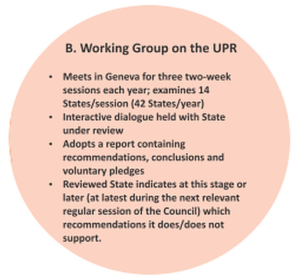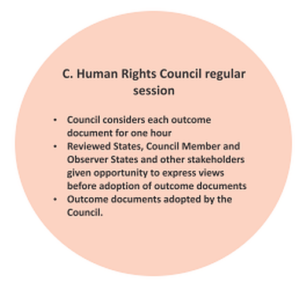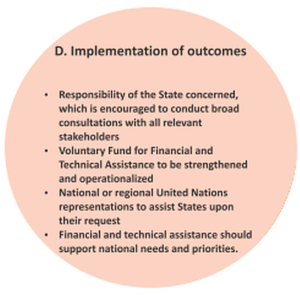
GENEVA SPECIFIC SEMINARS DURING THE UPR
2. THE GENEVA BRIEFINGS (GCB)
GHR Geneva Briefings are held on the occasion of a specific UN human rights meeting. Due to the new modalities and working methods of the HR-Council, demands for briefings before the sessions increased. We therefore prepared specific briefings for sessions of the Council, and of its mechanisms, for the Universal Periodic Review and for sessions of the treaty monitoring bodies. Some Briefings also aim at drawing attention on a burning issue, and are followed by a press conference. Open to all defenders, the Geneva Briefings contain a presentation of the UN system, and information and brainstorming on the specific theme. They are free of charge for NGOs delegates, interns and as defenders present in Geneva.
The Universal Periodic Review (UPR) is an important additional tool to implement human rights within countries. The GHR specific training scheme on UPR covers all the stages of the UPR process: contribution to the State’s report; preparation of the stakeholders’ reports; State review in the UPR Working group; adoption of the report by the Group, and then by the HR-Council; and, follow-up in each country. GHR also contributed to the creation of UPR-Info, a documentation and communication tool for stakeholders.
In its Courses, GHR describes potential NGO contribution. It advises on the long-term perspectives, cooperation with the States and the use of all UN recommendations (special procedures, treaty bodies and UPR) in order to implement all the rights in each country. Naturally, each UPR Course addresses the specificity of the situation in each country.
As many NGO coalitions come to Geneva to attend the review of their country, GHR offers them briefings and orientation at each UPR session.
Tool for implementation
Created by the founding resolution of the HR-Council (2006), the Universal Periodic Review (UPR) constitutes a unique and additional tool for human rights implementation, at least in those States genuinely cooperating (even partially) with the mechanism. UPR is a review of States by States, but OHCHR summarizes NGOs reports in an official document for the debate on each country. NGOs have also to participate in the critical follow-up: the implementation inside the country of the recommendations accepted by the State.
GHR has specific Course on UPR. In many In-Country Courses, GHR explains the process, the preparation of the civil society contributions, and the strategies to obtain the implementation of the UPR recommendations.
As many defenders undertake the trip to Geneva to attend the debates on their country, GHR conducts training Courses and briefings for them during each session of the Working group. Most defenders and NGOs stay in Geneva only for the days of review of their countries. Thus, the Seminars do not last the entire sessions of the Working group.
GHR conducts On-Demand Courses and briefings. A priority is given to training national coalitions. This was done for coalitions from Colombia, Mexico, the Russian Federation, Philippines, India, Sri Lanka, Kazakhstan, Vanuatu, Nepal, Mozambique, Botswana, Saudi Arabia and Jordan.
As many NGO coalitions come to Geneva to attend the review of their country, GHR offers briefings and orientation at each UPR session.
GSS Seminars and Briefings
UPR and National Workshop in Botswana
(Geneva, January 2018 & Gaborone, November 2018)
GHR cooperated with NGOs from Botswana on the occasion of the third UPR review of that country (January 2018). After the review, together with the Botswana Centre for Human Rights DITSHWANELO, GHR convened a national Workshop in Botswana to facilitate the process of implementation of the UN recommendations (Gaborone, November 2018).
Orientation to Russian NGOs
(Geneva, May 2018)
The UPR mechanism was at the centre of the GHR Course for Russian lawyers (Moscow, 9-10 April). Participants were asked to prepare a letter to the special procedures as well as an oral statement. One of them, representing Greenpeace Russia, presented her (improved) oral statement in Geneva during the pre-UPR session of May 2018.
Briefing to partners from Hong Kong
(Geneva, October 2018)
On 12 October, GHR welcomed several human rights defenders from the Umbrella movement in Hong Kong who came to Geneva to prepare for the review of China. As well as providing a unique window through which to monitor China, Hong Kong is a space where democracy and rule of law are demanded by many.
Advice to partners from Tibet
(Geneva, October 2018)
In 2018, GHR gave several briefings on the best ways to prepare stakeholders’ reports for China’s UPR (6 November). Unfortunately, in the wake of China’s 3rd UPR, the OHCHR removed seven submissions from its final document on civil society’s contributions.
On 17 September, GHR’s President chaired the side-event of the Society for Threatened Peoples on: ‘Human Rights in China – Seeking Solutions (the case of Tibet)’. He was also a panellist at the side-event of the Society for Threatened Peoples on the eve of China’s review (5 November). The GHR team attended the Forum convened by the Department of Information & International Relations (DIIR) of the Central Tibetan Administration, (CTA) entitled ‘Human Rights situation in regions under the PRC’ (2 November).
Assisting partners from Nigeria
(Geneva, October 2018)
On 11 October, the GHR team met and advised a delegation of Churches in Nigeria at a meeting convened by the WCC on the occasion of the ‘pre-UPR session’.
In 2017,
Course for defenders from Morocco
(Geneva, April and May 2017)
At the request of the Friedrich-Ebert Foundation (FES), GHR assisted members of the Moroccan ‘Association Adala pour le droit à un procès équitable’ (hereafter ‘Adala’), who came to Geneva on the occasion of the review of Morocco during the 27th session of the UPR Working Group, which took place from 1 to 12 May 2017.
With several NGOs and in partnership with FES Morocco, Adala had prepared the stakeholder’s report for the review of Morocco. Ira Engel (FES) and Adrien-Claude Zoller (GHR) held a first briefing for two Adala members attending the UPR pre-session (4 and 5 April) to explain the process in Geneva, analyze the Moroccan NGOs recommendations and facilitate contacts with diplomatic missions.
From 1 to 4 May, GHR conducted a Course for the Moroccan coalition present in Geneva. It included a general course on the UPR process, the analysis of the priorities of Moroccan NGOs, the monitoring of the review of Tunisia, the assessment of the outcome of the review of Morocco, the drafting of a press statement and the follow-up strategies.
Assisting partners from the Philippines
(Geneva, March, May and September 2017)
Following a side-event by the United Evangelical Mission (UEM, Wuppertal) on 15 March 2017 GHR met the General Secretary of the United Church of Christ in the Philippines (UCCP) and discussed the best ways to support Filipino NGOs in the UPR process.
On 4 May 2017, GHR met the Filipino NGOs and discussed their programme until the review of the Philippines of 8 May 2017. This review was disturbing, as the Government tried to justify the ‘cleaning’ of the streets with summary killings, and brutally attacked UN Special Rapporteurs, in particular the one on summary executions.
The main human rights organisations from the Philippines spoke the next day at the Conference convened on 9 May 2017 by the WCC and moderated by Clementine Gaspar.
On the same afternoon, GHR gave a briefing to this NGO Delegation. The trainer of GHR analyzed the attitude of the Governmental Delegation. He explained how to deal with the recommendations made during the review. On short term one had to focus on the ‘deferred’ recommendations (those for which the Government did not take a stand during the review, but has to define its position before the UPR report adoption during the HR-Council of September). He also proposed elements for a strategy during the coming year.
After the adoption of the UPR report of the Philippines, GHR and the WCC convened a working meeting with Filippino NGOs and partners in Geneva to assess the achievements of the UPR process and prepare the follow-up activities in the country (25 September).
Support to the coalition of Indian NGOs
(Geneva, Ecumenical Centre, April, May and September 2017)
GHR intervened in the meeting convened by the WCC with the delegation of Christian Churches in India (7 April). The meeting was chaired by Clementine Gaspar. The delegation highlighted Increasing gaps in income distribution and religious intolerance.
For the review of India, GHR invited two of its partners to Geneva, Kirity Roy (a former GHR trainee) and Dipyaman Adhikary. The day after the review, GHR participated in the side-event convened by the Indian NGO delegation (5 May). During the discussion, Adrien-Claude Zoller commented on the follow-up to the recommendations and on the future strategies to implement international recommendations and to raise the Indian situation in the UN, in particular through the use of the thematic procedures.
GHR also met the NGO coalition from India during the 36th session of the HR-Council, on the occasion of the adoption of the UPR report of India (21 September). During this meeting participants prepared GHR post-UPR training held in Delhi on 3 October 2017.
NGOs from Indonesia and Papua in UPR
(Geneva, Palais des Nations, May and September 2017)
A former GHR trainee, Wensislaus Fatubun, spoke in the name of the Forum of Commissions for Justice, Peace and Integrity of the Creation of West Papua at the UPR Pre-session of Indonesia, convened by UPR.Info (4 April).
Invited by GHR to Geneva, Filep Karma, a former political prisoner, intervened during NGOs on the UPR Indonesia (3 May). Another GHR trainee from Papua read out the joint statement of NGOs before the HR-Council on the occasion of the adoption of the UPR report of Indonesia (21 September).
In 2016,
Assisting defenders from Singapore
(Geneva, January and June 2016)
From 25 to 28 January, GHR assisted three defenders from Singapore who came to Geneva to monitor the examination of their country in the UPR Working group. GHR prepared several meetings for them with NGOs and diplomats. We gave them a briefing on the trends in the HR-Council and we had a last meeting with them to evaluate the outcome of the UPR examination and to prepare the press release and the priorities for the next initiatives.
GHR provided further orientation during their second stay in Geneva, when the HR-Council adopted the report of Singapore. On 24 June, Forum Asia organized with them a side-event on ’Singapore’s responses to the UPR recommendations’.
Briefing to students from Maynooth University
(Geneva, Palais des Nations, 11 May 2016)
GHR assisted the Maynooth University in the preparation of the visit of 25 students to Geneva to observe Ireland’s UPR examination of 11 May. Thomas Harris and Adrien-Claude Zoller gave them a briefing on the UN mechanisms and procedures. GHR met again the students to evaluate the examination of the Irish situation during the UPR Working group.
Lecture at the UPR Seminar of Ebert Foundation and CIFEDHOP
(Geneva, CAGI, 19-20 April, 2016)
The Ebert Foundation and the training centre CIPHEDOP convened a Seminar entitled ‘UPR a human rights awareness-raising process’. Adrien-Claude Zoller spoke of the experiences of the engagement of the civil society with the UPR Process. The workshop brought together 16 actors from civil society and national institutions and discussed various practices employed to use the UPR as a lever of understanding and dissemination of human rights.
Indigenous Peoples in Asia and UPR
(Geneva, Palais des Nations, Room XXV, 19 September)
GHR, the World Council of Churches, Action Network Philippines, Sri Lanka Advocacy Network, International Coalition for Papua, West Papua Network, Franciscans International (FI), and Vivat International, convened a side-event on ‘Human Rights of Indigenous Peoples in Asia at the UPR’. Chaired by Adrien-Claude Zoller, the meeting highlighted the cases of the Philippines, Indonesia, and Sri Lanka,
The speakers, Ms Victoria Tauli-Corpuz (UN Special Rapporteur on indigenous peoples’ rights), Ms Joeven Reyes (Executive Director, Sulong CARHRIHL, Philippines), Mr Paul Mambrasar (Elsham, West Papua, Indonesia), and Mr Sunanda Deshapriya (Journalist, Sri Lanka Brief), recalled the variety of human rights violations indigenous peoples in Asia are confronted with. They stressed that indigenous defenders speaking out face intimidation and violence, often committed by the State security forces, and that in the UPR, the human rights situation of Asian indigenous peoples did not receive ample attention.
In 2015,
As many NGO coalitions come to Geneva to attend the review of their country, since December 2008 GHR offers briefings and orientation at each UPR session. GHR main training activities during the UPR sessions in 2015 were:
- Briefing to NGOs from Laos (20 January);
- Briefing to NGOs from Honduras (with Misereor, 12 March);
- Briefing to the NGO delegation from Honduras (convened by the F. Ebert Foundation, 8 May);
- During the 10th UPR training for civil society organisations, conducted in Geneva by CIPHEDOP from 27 October to 2 November, 30 trainees attended the course given by Adrien-Claude Zoller on the UPR mechanism (27 October); the trainees came from Algeria, Burkina Faso, Chad, Congo, DRC, Ivory Coast, Mali, Morocco, Mauritania, Senegal, Sierra Leone, Tunisia, Malaysia, Nepal, Hawai, Albania, Bulgaria, Macedonia, Moldavia, Ukraine, Canada and Switzerland;
- Chairing the side-event of FES with Nepalese NGOs (on the occasion of UPR, 4 November 2015);
- Briefing to Australian partners (9 November 2015).
In 2014,
- 18th UPR session (27 January to 7 February 2014)
GHR co-sponsored the ‘side-event’ of the Ebert Foundation and the Coalition of Dominican NGOs on the recommendations made during the review of the Dominican Republic (4 February). Maria Teresa Tienda Rivera also assisted the NGO coalition in the meetings with several Governmental delegations.
- 19th UPR session (28 April to 9 May 2014)
GHR efforts focused on the situation in the DR-Congo. GHR provided advice and orientation to NGOs from the DRC and to solidarity organizations (19 April).
- 20th UPR session (27 October – 7 November 2014)
GHR significantly developed its working relations with NGOs and lawyers from the Arab world. In 2013, it gave a specific Course to defenders from Saudi Arabia and a UPR briefing to a NGO delegation from Jordan. In January 2014, the President advised in Dubai a group of lawyers. During the 20th UPR session, it joined the Ebert Foundation’s initiative on Iraq.
| Side-event on the UPR of Iraq
(Palais des Nations, 4 November 2014) |
GHR President opened the session and recalled that the implementation inside the country of the recommendations accepted during the review was the main aim of UPR. Close cooperation between Government and civil society was required. Iraq’s Deputy Minister of Human Rights, Dr. Abdul Kareem Shallal, commented on the recommendations made during the review, and the Chair asked him for several clarifications before giving the floor to the two non-governmental representatives present, Ms. Afyan Raheem Ali Ghulam Ali (Alliance for Rights ‘Houqoq’) and Mr. Haider Kadhim Khudur (ENSAN, Alliance for Human Rights).
A dialogue started between the three speakers on the main gaps undermining the respect of Iraq’s human rights obligations: the gaps between ratification of treaties, transposition into domestic law, and lack of implementation of the existing domestic law. Other questions were raised from the room, in particular concerning the Palestinians in Iraq and the severe persecution of the Mandaean minority.




